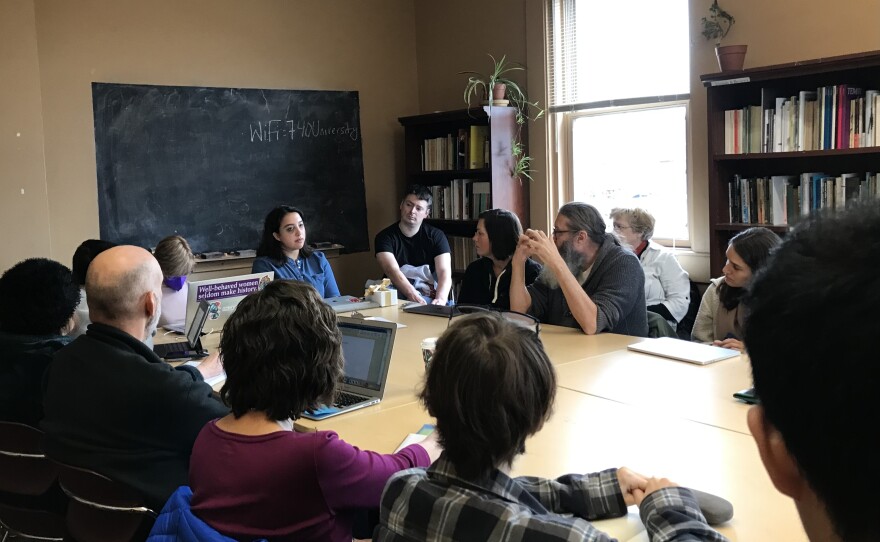It’s a Saturday afternoon in December. About 20 people are packed into a small, white-walled room at Writers and Books on University Avenue.
Most sit at a large table while the rest squeeze into seats against the walls. For an hour, they chat and they write.
RIT professor Jessica Pavia started this writing group just before summer. The group meets most Saturdays and Pavia said the participants tend to fill the room.
“There were a few open mics. Most of them are poetry specific, and I just don't write poetry,” Pavia said. “So I wanted to create something kind of selfishly because I just wanted to know and meet other writers in the area.”
Declining literacy rates nationwide and in Rochester point to a growing segment of the population unable to write their own stories. Yet this local community writing group is working to keep the art alive.
Writing has been Pavia’s longtime companion. It was there for her as a shy kid with big feelings and it’s here for her now. She is a regular contributor to CITY magazine.
“It's also a really low barrier to entry when it comes to art forms. You need a pen and a paper — a keyboard, if you're fancy.”
But for some, there is a barrier — they can’t easily read or write.
Defining illiteracy is complicated because it’s a spectrum. The National Adult Literacy Survey breaks it down into five levels of competency in reading and writing skills. The line between literate and illiterate generally comes down to the ability to read, write and understand simple sentences.
New York state has the second-highest illiteracy rate in the country, according to the World Population Review. Roughly one in five adults are considered illiterate.
“I can't even imagine what it would have been like not to have been able to read and write,” said Nina Gaby, a regular at Pavia’s writing groups. “That's really a heartbreaking question, isn't it? Because it's been so important to me in every aspect.”
Storytelling is ingrained in the 73-year-old. She started writing when she was 7 years old. It waned for a while as she got older, until one day when a song came on the car radio.
“‘This Old Heart of Mine.’ I'll never forget it,” Gaby said. “The song opened up this rush of emotion about what we lose as we grow up. I literally was speeding down St. Paul Boulevard. I pulled off on a side street. I pulled out some papers I had in my briefcase, and I wrote a short story sitting by the side of the road.”
Gaby went on to write more stories and become a published author. Beyond that, her work as a psychiatric nurse revolves around people’s stories. They tell her and she writes it down. It can have a powerful effect on the patient, she said.
“A lot of them are very, very devastating stories that they've never talked about,” she said.
Stephen Dornelus, 29, also believes in the power of stories. He attributes his strong imagination to growing up reading.
“Books really allow your brain to kind of take different shapes because you're constantly presented with new worlds, new ideas. And so, you're integrating that into your mind,” Dornelus said. “So, if you're missing that during your most important years developmentally — I don't think I would be the person I am right now.”
It’s about more than just self-fulfillment and quality of life, he said. It’s about having the power to shape society and contribute to cultural narratives.
“That is like how cultures kind of develop, it's how stories are kind of expressed,” Dornelus said. “Events can happen, but the way that the events are told or what's emphasized kind of reveals what a culture holds important."
It’s crucial to foster this skill in the next generation, he added.
“If someone is struggling, that means part of society is struggling,” he said. “So, anything we can do to uplift as many people as possible should be the priority.”



